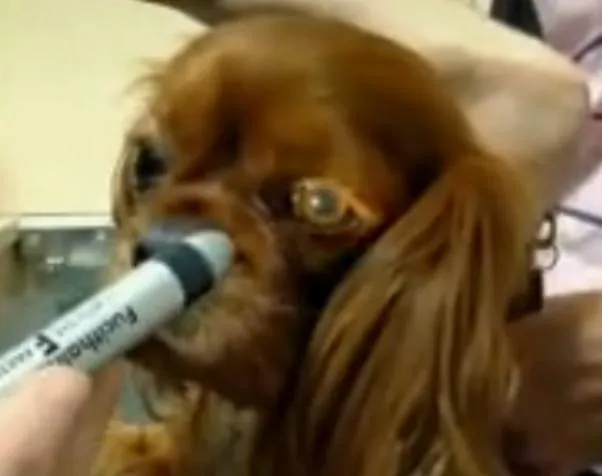Bringing a Cavalier King Charles Spaniel into your home is an experience filled with joy and companionship. These charming dogs, known for their affectionate nature and beautiful appearance, become cherished family members. However, responsible ownership extends beyond daily walks and cuddles; it profoundly includes a commitment to their long-term health. Due to their genetic predisposition to certain conditions, proactive Cavalier King Charles Spaniel Health Testing is not just recommended, but crucial for ensuring a long and vibrant life for your furry friend. This guide will walk you through the essential health screenings every Cavalier owner should consider, from understanding common breed-specific ailments to navigating health clinics and registration processes.
Why is Health Testing Crucial for Cavalier King Charles Spaniels?
Cavalier King Charles Spaniels, like many purebred dogs, are susceptible to a range of hereditary health issues. While responsible breeding practices aim to minimize these risks, regular health testing provides vital insights into your dog’s current condition and potential future concerns. For breeders, these tests are indispensable, helping to ensure that breeding stock is free from or a carrier of certain genetic conditions, thereby working to produce healthier generations of puppies. For pet owners, early detection of issues allows for timely intervention, better management of conditions, and improved quality of life. Understanding these predispositions is key to taking care of cavalier king charles puppy into adulthood.
Understanding Common Health Concerns in Cavaliers
Several health issues are particularly prevalent in Cavalier King Charles Spaniels, making targeted health testing a priority. Awareness of these conditions empowers owners to take proactive steps.
Mitral Valve Disease (MVD)
MVD is the leading cause of death in Cavalier King Charles Spaniels. It is a progressive heart condition where the mitral valve degenerates, leading to a heart murmur and eventually heart failure. Regular cardiac examinations are paramount for early detection.
Eye Disorders
Cavaliers can be prone to various eye conditions, including hereditary cataracts, retinal dysplasia, and dry eye syndrome. Comprehensive ophthalmic examinations are essential to monitor and address these issues.
Syringomyelia (SM)
Syringomyelia is a severe, progressive neurological condition affecting the brain and spinal cord, often caused by a skull malformation (Chiari-like malformation). It can lead to pain and neurological deficits. MRI scans are the definitive diagnostic tool.
Hip Dysplasia & Patellar Luxation
While not as common as MVD or SM, Cavaliers can still be affected by orthopedic issues like hip dysplasia (malformation of the hip joint) and patellar luxation (dislocation of the kneecap). X-rays and physical examinations are used for diagnosis.
Thyroid Issues & Hearing
Hypothyroidism, an underactive thyroid gland, can occur in Cavaliers and lead to various symptoms. Hearing loss, particularly congenital deafness, can be screened for using BAER (Brainstem Auditory Evoked Response) tests.
 Veterinarian applying eye drops to a Cavalier King Charles Spaniel's eyes
Veterinarian applying eye drops to a Cavalier King Charles Spaniel's eyes
Essential Health Tests for Your Cavalier
Proactive health testing involves a series of specialized examinations performed by board-certified veterinary specialists. These tests go beyond a routine check-up, offering a deeper look into the specific health markers relevant to the Cavalier King Charles Spaniel breed.
Cardiac Evaluations: Beyond the Murmur
A board-certified veterinary cardiologist will perform an auscultation (listening to the heart with a stethoscope) to detect any heart murmurs. For breeding dogs, or any dog where MVD is suspected, an echocardiogram provides a detailed ultrasound of the heart’s structure and function. These clinics are generally not for dogs already diagnosed with advanced MVD, but rather for screening potential breeding stock or for early detection. Owners should always seek regular, specialized care for MVD-affected dogs from a cardiologist.
Ocular Health: Protecting Your Cavalier’s Sight
A board-certified veterinary ophthalmologist examines the dog’s dilated eyes for a range of hereditary eye disorders. This typically involves using an ophthalmoscope to inspect the retina and other eye structures. The results are usually recorded on forms provided by organizations like the Orthopedic Foundation for Animals’ (OFA’s) Eye Certification Registry (CAER).
Neurological Screening: Addressing Syringomyelia
While not as commonly offered at general health clinics, MRI scans are the most definitive way to diagnose Syringomyelia (SM). Due to the specialized equipment and expertise required, these clinics are less frequent. Owners seeking SM screening should inquire directly with specialized veterinary neurology centers or clinics that specifically advertise MRI screening.
Orthopedic Assessments: Hips and Patellas
Evaluations for hip dysplasia and patellar luxation typically involve physical examinations and X-rays. These tests assess the integrity and alignment of the hip joints and kneecaps, respectively. The results can be registered with organizations like the OFA. Understanding genetic diseases in pedigree dogs is vital, and orthopedic screening is a key part of that.
Other Important Screenings: Thyroid and Hearing
Thyroid panels involve blood tests to check thyroid hormone levels. Dogs should fast for 12 hours prior to these tests. Hearing tests, such as the BAER clinic, assess a dog’s auditory function. Information on these and other specialized tests like Dentition (teeth) or RFGS (Respiratory Function Grading Scheme) can often be found at larger multi-test clinics.
Navigating Health Testing Clinics and Registration
Health testing clinics provide an excellent opportunity for Cavalier owners to have their dogs screened by specialists, often at a discounted rate. These clinics are frequently organized by breed clubs or kennel clubs, usually in conjunction with conformation shows.
Finding Reputable Clinics
Many organizations, such as breed-specific clubs and larger kennel clubs, periodically host health clinics across the United States and Canada. These events bring together board-certified cardiologists and ophthalmologists who can provide official evaluations. It’s important to consult schedules, often published on club websites or dedicated health pages, to find upcoming clinics in your area. Look for clinics that explicitly state the veterinarians are board-certified by the American College of Veterinary Internal Medicine (ACVIM) for cardiology and the American College of Veterinary Ophthalmologists (ACVO) for ophthalmology.
Registration and Preparation Tips
Appointments at these clinics are often limited and require pre-registration, sometimes with fixed deadlines and payments in advance. Always contact the clinic’s designated contact person for precise details. You may need to provide specific documentation, such as AKC registration, previous OFA/CERF numbers, pedigrees, or microchip/tattoo certificates. Most test prices do not include OFA or CERF registration fees, so factor that into your planning. For blood tests, ensure your dog fasts for at least 12 hours beforehand. Some clinics may have restrictions on testing other breeds, so always confirm eligibility. For detailed guidance on preparing for different types of evaluations, including dna and health test for dogs, thorough preparation ensures a smooth process.
Understanding OFA and ARCH Certifications
The Orthopedic Foundation for Animals (OFA) is a well-known organization that provides a public database for health clearances, helping breeders and owners make informed decisions. Many clinics utilize OFA forms for reporting results. The ACVIM Registry of Certified Health (ARCH) is another valuable certification program, introduced by board-certified cardiologists, to certify dogs’ hearts are clear of MVD and other genetic heart disorders. ARCH also certifies vision free from ophthalmology disease. These certifications provide a standardized and reliable way to document health statuses. You can often save time at clinics by downloading and pre-filling OFA forms from their website.
 A close-up of a Cavalier King Charles Spaniel's eyes being examined
A close-up of a Cavalier King Charles Spaniel's eyes being examined
Conclusion
Cavalier King Charles Spaniel health testing is a fundamental aspect of responsible pet ownership, offering peace of mind and the best possible care for these beloved dogs. By understanding the breed’s specific health predispositions and engaging in regular, appropriate screenings, you contribute significantly to your Cavalier’s well-being. Always consult with your veterinarian for personalized advice regarding your dog’s health needs and to discuss the most suitable testing regimen. Proactive health management not only helps in early detection and treatment of potential issues but also supports the overall health of the Cavalier King Charles Spaniel breed for generations to come. Stay informed, stay proactive, and cherish every moment with your healthy Cavalier.
